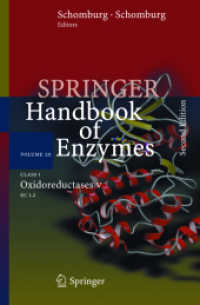- ホーム
- > 洋書
- > 英文書
- > Philosophy
基本説明
New in paperback. Hardcover was published in 2009. Daniel Garber presents a study of Leibniz's conception of the physical world, elucidating his puzzling metaphysics of monads, mind-like simple substances. Tracing the development of Leibniz's thought, Garber shows how dealing with problems about the physical world lead him to a world of animate creatures, and finally to a world of monads.
Full Description
Daniel Garber presents an illuminating study of Leibniz's conception of the physical world. Leibniz's commentators usually begin with monads, mind-like simple substances, the ultimate building-blocks of the Monadology. But Leibniz's apparently idealist metaphysics is very puzzling: how can any sensible person think that the world is made up of tiny minds? In this book, Garber tries to make Leibniz's thought intelligible by focusing instead on his notion of body. Beginning with Leibniz's earliest writings, he shows how Leibniz starts as a Hobbesian with a robust sense of the physical world, and how, step by step, he advances to the monadological metaphysics of his later years. Much of the book's focus is on Leibniz's middle years, where the fundamental constituents of the world are corporeal substances, unities of matter and form understood on the model of animals. For Garber monads only enter fairly late in Leibniz's career, and when they enter, he argues, they do not displace bodies but complement them. In the end, though, Garber argues that Leibniz never works out the relation between the world of monads and the world of bodies to his own satisfaction: at the time of his death, his philosophy is still a work in progress.
Contents
Introduction ; 1. First Thoughts ; 2. Reforming Mechanism: Unity ; 3. Reforming Mechanism: Body and Force, Matter and Form (I) ; 4. Reforming Mechanism: Body and Force, Matter and Form (II) ; 5. Complete Individual Concepts, Non-Communication and Causal Connection ; 6. Divine Wisdom and Final Causes ; 7. Leibnizian Phenomenalisms ; 8. Enchanting the World: "...after many corrections and forward steps in my thinking" ; 9. Monads, Bodies and Corporeal Substances: The Endgame ; Epilogue ; Bibliography ; Index








